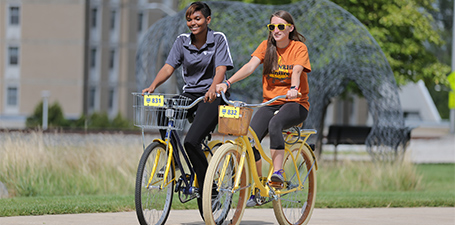Crisis Resources
are you in crisis?........if so, take a deep breath and call 9-8-8
Distress
- Increased nervousness, sadness, or mood fluctuations
- Feeling isolated
- Easily overwhelmed or irritated
- Trouble with sleeping or eating
- Difficulty enjoying activities
- If not addressed, can lead to crisis or emergency
Options
- Visit our self-help pages
- Visit a Rocket RESTore site for a free massage chair experience
Crisis
- Experiencing severe mental health symptoms such as:
- Suicidal or homicidal ideation, plan, or intent
- Mania
- Hallucinations and delusions
- Interpersonal violence
- Recent sexual assault
- Loss of housing or food insecurity
- Death/loss of significant person
Options
- Video connect with a clinician (12 p.m. -12 a.m. EST every day except holidays) through Mantra Health
- Call or text 988 (24/7)
- Call 419.530.CARE (2273) (24/7)
- Click here for a list of local and national resources/agencies that can help with a crisis.
Emergency
- Active plan to cause harm to self or others
- Substance overdose
- Current medical emergency, harm has been caused
Options
- Call 9-1-1
- Get to the nearest emergency room
Mental health challenges are a common human experience that can affect anyone, regardless of age, gender, or background. We acknowledge that seeking help is a courageous act that deserves support and compassion. By providing a space for you to openly discuss your experiences and lending a listening ear, we create space for you to feel heard and understood. Sharing vulnerabilities and setbacks helps individuals realize they are not alone in their struggles, and fosters a sense of community and belonging. It is through these conversations that we can provide support, resources, and guidance to those who may be going through a mental health crisis. Just as we seek medical assistance for physical ailments, seeking therapy or counseling for mental health challenges is a natural and necessary step towards healing.
In a crisis, you have options!
You can always utilize national crisis support by calling or texting 988.
You can call the NEW UCC 24/7 Crisis Support Phone Line at 419.530.CARE (2273).
You can text "HOME" to the National Crisis Text Line 741741.
For immediate assistance utilize the newest addition to our Crisis Care options Mantra Health. Call 24/7 at 419.530.2273 or create a log in to do a virtual face-to face meeting between 12 pm -12 am EST.
Please note the Counseling Center has changed offerings. Fall semester walk in hours are Monday through Friday 10 am to 2 pm, first come, first served.
Visit the local crisis center for the appropriate level of support you are seeking. Contact Zepf Center today: 419.841.7701. Crisis Care Line: 419.904.CARE (2273). 24/7 Detox Admission Line: 419.754.DTOX (3869).

Click here for a list of local and national resources/agencies that can help with a crisis.
- Seek Professional Help: Make an appointment with the Counseling Center or another mental health provider to discuss your experience during the crisis and develop a tailored treatment plan.
- Build a Support System: Surround yourself with supportive and understanding friends, family members, or support groups. Talking to others about your feelings and experiences can be beneficial.
- Prioritize Self-Care: Focus on meeting your basic needs, such as getting enough sleep, maintaining a balanced diet, staying hydrated, and engaging in regular physical activity.
- Avoid Isolation: Stay socially connected with others, even if it feels difficult at times. Loneliness can worsen mental health symptoms.
- Practice Mindfulness: Mindfulness exercises can help reduce stress, promote relaxation, and improve self-awareness.
- Set Realistic Goals: Start with small, achievable goals and celebrate your progress. This can help build a sense of accomplishment and boost self-esteem.
- Monitor and Manage Triggers: Identify triggers that may exacerbate your mental health condition and develop coping strategies to manage them effectively. This could include journaling, art therapy, deep breathing exercises, or talking to someone you trust.
- Engage in Activities You Enjoy: Participate in hobbies and activities that bring joy and fulfillment to your life. Engaging in positive experiences can improve mood and reduce stress.
- Limit Substance Use: Avoid or limit the use of alcohol and other substances, as they can interfere with your recovery process and worsen mental health symptoms.
- Attend Follow-Up Appointments: Regularly attend follow-up appointments with your mental health professional to assess your progress and make any necessary adjustments to your treatment plan.
- Educate Yourself: Learn about your mental health condition and treatment options. Knowledge can empower you to make informed decisions about your well-being.
- Be Patient with Yourself: Recovery takes time, and setbacks are normal. Be gentle with yourself and avoid self-criticism.
- Know When to Seek Help: If you experience any worsening symptoms or feel overwhelmed, reach out to your mental health provider immediately or seek emergency assistance if necessary.


